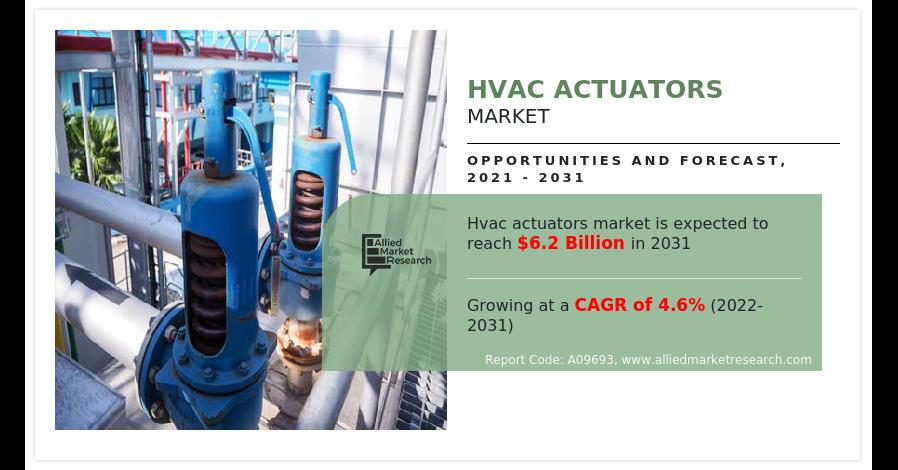(MENAFN- EIN Presswire) Hvac Actuators Market 2031
Hvac Actuators Market by Type (Spring Return, N?n Spring Return), by Technology (Smart, Conventional)
PORTLAND, UNITED STATES, March 1, 2023 /einpresswire.com / -- HVAC (Heating, Ventilation, and Air Conditioning) systems play a crucial role in maintaining indoor air quality and temperature. The HVAC system consists of various components, including the actuators, which are responsible for controlling the airflow and temperature. hvac actuators are essential components that help in regulating the air handling system. In this blog, we will explore the role of HVAC actuators, their types, and how they work.
hvac actuators market size was valued at $3.9 billion in 2021, and is projected to reach $6.2 billion by 2031, growing at a CAGR of 4.6% from 2022 to 2031.
Download Sample Report :
COMPETITION ANALYSIS
The major players profiled in the HVAC actuators market include Continental AG, Denso Corporation, Dwyer Instruments Inc, Electro Craft Inc., Honeywell International Inc., Johnson Controls International plc., Robert Bosch GmbH, Rotork Plc., Schneider Electric SE, Siemens AG.
What are HVAC actuators?
HVAC actuators are devices that control the movement of various HVAC system components. They are responsible for opening and closing valves, dampers, and other mechanical parts of the system that regulate the airflow and temperature. HVAC actuators are essential components that help in maintaining a comfortable and healthy indoor environment.
Types of HVAC actuators:
There are several types of HVAC actuators, each designed to perform a specific function. The most common types of HVAC actuators include:
Pneumatic actuators: Pneumatic actuators are controlled by compressed air and are commonly used in HVAC systems. They are simple, reliable, and can operate in extreme temperature conditions.
Electric actuators: Electric actuators are powered by electricity and are commonly used in HVAC systems. They are more precise than pneumatic actuators and can provide continuous control over the airflow and temperature.
Hydraulic actuators: Hydraulic actuators are powered by hydraulic fluid and are commonly used in HVAC systems that require high force and torque.
Thermal actuators: Thermal actuators are controlled by changes in temperature and are commonly used in HVAC systems that require automatic temperature control.
Buy This Report :
How do HVAC actuators work?
The working principle of HVAC actuators varies depending on their type. However, most HVAC actuators work by converting an input signal into mechanical motion. The input signal can be electrical, pneumatic, or hydraulic, depending on the type of actuator.
Pneumatic actuators work by converting the pressure of compressed air into mechanical motion. When the input signal is received, the actuator's diaphragm moves, and the valve or damper opens or closes.
Electric actuators work by converting an electrical signal into mechanical motion. When the input signal is received, the actuator's motor rotates, and the valve or damper opens or closes.
Hydraulic actuators work by converting the pressure of hydraulic fluid into mechanical motion. When the input signal is received, the actuator's piston moves, and the valve or damper opens or closes.
Thermal actuators work by expanding or contracting based on changes in temperature. When the temperature changes, the actuator expands or contracts, and the valve or damper opens or closes.
Applications of HVAC actuators:
HVAC actuators have several applications in the HVAC industry. They are used in the control of air handling units, variable air volume systems, dampers, and valves. Some of the common applications of HVAC actuators include:
Temperature control: HVAC actuators are used in the control of temperature in HVAC systems. They help in regulating the flow of air and temperature to maintain a comfortable indoor environment.
Airflow control: HVAC actuators are used to control the airflow in HVAC systems. They help in maintaining proper ventilation and preventing the buildup of pollutants and allergens in the indoor air.
Energy efficiency: HVAC actuators are used in energy-efficient HVAC systems to regulate airflow and temperature. This helps in reducing energy consumption and costs.
Zone control: HVAC actuators are used in zoning systems to regulate temperature and airflow in different areas of a building. This helps in maintaining a comfortable indoor environment and reducing energy consumption.
Purchase Enquiry :
David Correa
Allied Analytics LLP
+ + +1 503-894-6022
email us here
Visit us on social media:
facebook
twitter
linkedin



















Comments
No comment